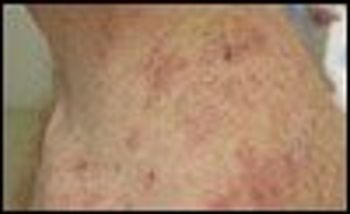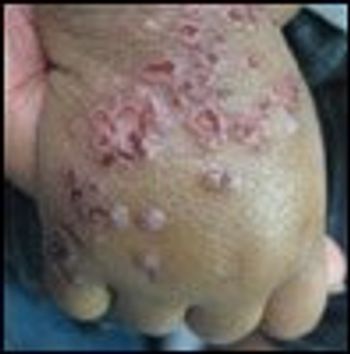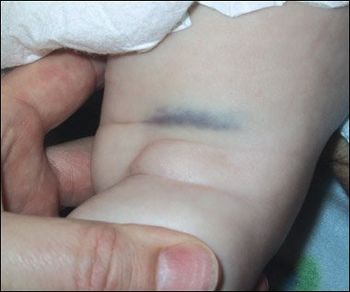
FDA has approved alglucosidase for patients aged 8 years and older for the treatment of late-onset Pompe disease.

FDA has approved alglucosidase for patients aged 8 years and older for the treatment of late-onset Pompe disease.

On June 4, the Health Information Technology Policy Committee's meaningful use workgroup gave testimony on how to include in the definition of "meaningful use" measures that could reduce racial, ethnic or any other disparities in the health of patients.

With the recent and highly publicized tragedy involving a Delaware pediatrician arrested and charged with 471 criminal counts of sexual abuse of patients more than 12 years old, I believe we are all called on to examine our office practice of examination and anticipatory guidance.

Exposure to PCBs is associated with immunotoxic effects on serum concentration of specific antibodies against diphtheria and tetanus vaccinations, according to new research.

More than 50% of primary care physicians say that they are underprepared to diagnose and treat patients with bipolar disorder.

I read with interest Drs Ha and Wilson’s “What’s Your Diagnosis?” case of an infant with a history of wheezing and dry cough ("History of Cough in an Infant and a Toddler"). In a setting such as this, one should also consider the possibility of foreign-body aspiration, which can result in recurring wheezing and pneumonia.

Here: a "how to" on Gomco circumcision, the method most commonly used in the US.

Thoughts of my summer vacation are on the back burner now as I prepare to welcome the incoming pediatric residents. July 1st has a special meaning to all of us who have survived the grind of an internship. Fear was probably my main emotion at the start of my residency, while I’m sure for others it was excitement and anticipation. On July 8, I have to give a talk to the newcomers at our institution.

An 18-year-old boy presented with a several-month history of an intermittent, very pruritic rash on his back that did not improve with topical corticosteroids. Physical examination revealed grouped erythematous papules with a few scattered small vesicles on his posterior neck and bilateral posterior shoulders at the location where his backpack frequently rubbed.

A 1-year-old boy presented with a 10-day history of a nonpruritic rash that had persisted and spread despite treatment with a topical corticosteroid. Mother reported that he was febrile at the onset of the eruption; he was given over-the-counter antipyretics. On day 3, his pediatrician evaluated his condition and prescribed amoxicillin for his fever and hydrocortisone cream for his atopic dermatitis. Over the next several days, the fever subsided; however, the rash, which had started on the child’s right hand, persisted and spread to his face and elsewhere.

A 3-month-old boy was brought by his mother to his busy primary care physician’s office for follow-up of bronchiolitis when numerous bruises were noted. The mother said that the infant had a 1-week history of unexplained bruising, petechiae, and irritability. The child was referred to the local emergency department (ED) because of concern for nonaccidental trauma.

The mother of this 7-year-old girl originally thought these peculiar scales in her daughter’s scalp and hair were nits, since there had recently been an outbreak of head lice at the child’s school. However, she was not able to find any lice, and the scales resisted removal with mineral oil and a “nit comb.”

I’ve just committed my family to a 5-day July vacation to Orlando so we can visit a new amusement park dedicated to Harry Potter. The famous series of books about the teenage wizard has really sparked the love of reading in many children, including mine. My kids are really excited about seeing Hogwarts come to life, but my husband is not so thrilled about being in the potentially sweltering heat of Florida in the middle of the summer.

HPV Vaccine : Meeting the challenges Puzzler : Teen troubled by trembling leg Dermcase : Swollen extremities threaten infant Drug-hormonal contraception interactions

Medical myths persist even today.

Switching medications or combining medicine with cognitive behavior therapy eliminated symptoms of depression in more than one-third of teenagers who were resistant to treatment, new findings show.

Human papillomavirus vaccines are a promising technology for primary prevention of cervical cancer and the other HPV-related diseases, but achieving high rates of vaccination in the age group targeted for vaccination presents a challenge. Pediatricians play a vital role in implementing national recommendations for HPV vaccination for children and adolescents.

A 3-week-old baby boy is brought to the emergency depratment with swelling of hands and feet. His extremities were edematous, erythematous, and appeared painful.

A mother's antibodies that can help shield her infant from getting measles may not last long, according to new research.

HFNC therapy resulted in a greater decrease in respiratory rate than other forms of respiratory support.

Medical advances have increased the number of chronically ill children who are surviving into adolescence and adulthood, and their interest in sex and sexual behavior mirrors that of healthy teen counterparts.

There is much physicians do not know about the risks and benefits of a woman attempting to deliver vaginally after having a cesarean birth.

Increased prevalence of overweight and obesity has led to many intervention programs promoting prevention.

Boys who ingest calcium often may have a higher metabolism at rest, compared with children who do not consume as much, a new report indicates.

A comprehensive pediatric cost analysis showed that suboptimal breastfeeding cost billions.

Children with severe asthma run 30 times the risk of asthma-free children of developing adult chronic obstructive pulmonary disease, a new study finds.

For some age groups, the pediatrician market share has become quite striking: almost 90% of visits for children less than 1 year of age are with pediatricians.

A diet that is high in fat may reduce infantile spasms significantly in young children, according to new research.

A 15-year-old girl presents to your office with a chief complaint of a "trembling leg" that has been bothering her for a few days.

Incidence of overt stroke risk in sickle cell disease has dropped more than 10-fold primarily from use of transcranial Doppler screening and prophylactic transfusion, according to new research.